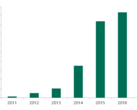A virus called “Olympic Destroyer” has caused some disruption at the 2018 Winter Olympics in South Korea. However, the disruption was brief and relatively contained, suggesting the virus could have been more appropriately named “Olympic Blip.” Cybersecurity experts working for companies like Cisco Systems Inc., CrowdStrike and FireEye Inc. have confirmed that there was a concerted effort to cause issues to information systems during the opening ceremony.
The cyber attack was mildly successful in terms of disruption caused: The Olympics website was knocked offline which created problems for people trying to print their tickets. The malware also affected the Wi-Fi service used by reporters during the opening ceremony. The attack further highlighted the ever-increasing threat of cyber hostilities even on seemingly harmless operations and events.
It is not yet known whether Olympic Destroyer also affected the drones that were going to be used in part of the opening ceremony program. The drones did not operate as expected but this slight failure was smoothly covered over by the ceremony directors, who used pre-recorded footage of the drones instead.
Nobody is sure who was behind the cyber attack yet. It could have been North Korean hackers looking to take some of the shine off their neighbors’ celebration; it could have been from angry Russians in protest against the suspension of the Russian Olympic Committee. Or it could have been caused by hackers who really just don't like curling or snowboarding.












